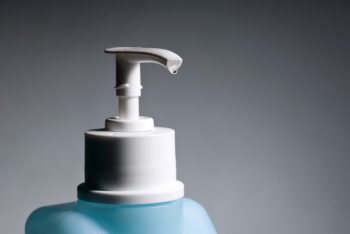Contributing writer for Wake Up World
A new study published in Occupational and Environmental Medicine may give you pause for thought the next time you reach for your favorite hand sanitizer. We’ve long known that the chemicals present in these products aren’t the best thing to be applying to the skin, not to mention they’re exceptionally drying. But occasional use can’t be that harmful, right? As it turns out, using chemical hand sanitizers can actually triple the risk of developing thyroid cancer.
The research team reviewed data from over 900 patients — 462 adults with thyroid cancer in 2010 and 2011 and compared them with 498 control subjects. They subsequently calculated exposure to the biocide chemicals based on both reported use and detailed information regarding occupational exposures. Those who work in medicine or cleaning — like healthcare providers in hospitals, home health assistants and professional building cleaners — were found to have the highest biocide exposure.
Although not involved with the study, Laura Koniver MD summarizes the study’s results as follows:
- Women with any occupational exposure at all were 48% more likely to develop thyroid cancer.
- Men with any occupational exposure at all were 300% more likely to develop thyroid cancer — 3 X the normal rates of thyroid cancers!
- The over all risk of using biocides increased thyroid cancer rates by 65%
- For those with highest cumulative exposures (associated with jobs that require hand sanitizer use such as health professions) the risk of thyroid cancer more than doubled.
- These biocide chemicals are known hormone disrupters… for example, Triclosan has been shown to interrupt and decrease the levels of several different thyroid hormones (necessary for growth and metabolism.)
Needless to say, it’s best to give these chemical-based sanitizers a wide berth if we would like to stay healthy. Not only are they potent hormone disruptors, but they’re already causing the creation of superbugs, where the bacteria and viruses are becoming resistant to these wipes, sprays and antibacterial hand soaps. And since many of these products contain alcohol, which dries and cracks the skin, they actually make you more exposed to the pathogens around you. Biocide chemicals can also put you at risk for hypothyroidism, damage reproductive organs and sperm quality, as well as disrupt the production of sex and thyroid hormones. But that’s not all.
Increased Blood Serum Levels of BPA Directly Connected to Hand Sanitizer Use
A study published in the journal PLOS found that holding a sales receipt and eating food after applying hand sanitizer significantly increased the absorption of Bisphenol A (BPA) by the body.
According to the study, holding a receipt printed on thermal paper — including airline boarding passes, as well as gas, ATM, cash register and many other types of receipts — for as little as 2 seconds after applying hand sanitizer, can increase BPA absorption by as much as 185 times. The researchers studied people in fast food restaurants, food courts and shopping malls, and found a “dramatic” increase in serum BPA levels after using hand sanitizer, holding a receipt, and then eating with the BPA-contaminated hand. Besides skin absorption on the hands, the main exposure was through the thin skin of the mouth, not the gastrointestinal tract.
Writes Chriss Kresser in BPA and Hand Sanitizer: a Toxic Mix With Serious Health Risks?:
“Hand sanitizers and other skin products (e.g. soaps, sunscreens, lotions) contain “dermal penetration enhancers” that are designed to enhance the delivery of the active ingredients they contain. Previous studies have found that dermal penetration enhancers can increase the absorption of estradiol, a chemical very similar to BPA, by as much as 100-fold.”
This is especially concerning since BPA has been linked with a wide-range of diseases, including obesity, diabetes, infertility, cancer, cardiovascular disease, poor immune function, inflammation, endocrine (hormonal) disruption, and neurological disorders like aggressiveness, hyperactivity and learning impairments.
Unfortunately, the chemical is everywhere and difficult to avoid. It’s not only found in thermal receipts, but also in plastic containers, food cans, cell phones, automobile parts, eyeglass lenses, sports equipment and more. Over 15 billion pounds of the stuff is manufactured each year. Incredibly, 93 percent of Americans have BPA in their urine.
So how do we minimize our exposure to both BPA and the toxins in biocide products?
A good place to start is to ditch chemical- and alcohol-based hand sanitizers altogether and use either natural essential oil sprays with thyme and lavender oil, or a reusable silver-infused disinfecting cloth. Don’t forget about good old-fashioned soap and warm water for washing hands to keep germs at bay.
We can also avoid handling thermal receipts (even with dry hands) for more than very brief periods of time. Using glass and stainless steel containers for food storage is another way to reduce BPA exposure, as is using glass and stainless steel water bottles. Lastly, baby bottles made of glass have made a comeback for parents who would like to protect their children from the chemicals in plastic.
Related reading:
- Toxic Products to Ban From Your Home – Plus Healthier Alternatives to Help You Do It
- How to Make Your Own Hand Sanitizer – 2 Easy Recipes!
- Are You Washing Your Hands With This Toxic Pesticide?
- Antibacterial Agent in Common Household Products Shown to Weaken the Heart and Muscles
Article sources:
- www.ncbi.nlm.nih.gov/pmc/articles/PMC2199288
- www.journals.plos.org/plosone/article?id=10.1371/journal.pone.0110509
- www.sciencedirect.com/science/article/pii/S0890623813003456
- www.oem.bmj.com/content/early/2017/02/15/oemed-2016-103931
- www.endocrineweb.com/news/hypothyroidism/1975-exposure-chemicals-hand-sanitizer-could-lead-hypothyroidism
- www.chriskresser.com/bpa-and-hand-sanitizer-a-toxic-mix-with-serious-health-risks
- www.intuition-physician.com/hand-sanitizers-linked-to-thyroid-cancer-heres-your-safer-alternative
Recommended articles by Carolanne Wright:
- Renowned Harvard Psychologist Says ADHD is Largely a Fraud
- Hyperbaric Oxygen Treatment Reverses Fibromyalgia in 70% of Patients, Researchers Find
- Wealth and Social Media Breed Narcissism and Lack of Empathy, Says New Research
- Over 100 Scientific Studies Agree: Cannabis Annihilates Cancer
- If You Care About Animals and the Earth, Here’s Why You Need to Boycott Palm Oil Immediately
- Brain Waves and Binaural Beats: A Gateway to Higher Consciousness, Enhanced Learning and Brain Function
- Latest Research on CBD Oil Offers New Hope for Healing Leaky Gut Syndrome and Autoimmune Disorders
- Scientific Breakthrough: Alzheimer’s Ultrasound Therapy Fully Restores Memory Function in Mice
- Why You Should Have a Himalayan Crystal Salt Lamp in Every Room of Your House
- States With Medical Marijuana Laws Have Lower Rates of Opioid-Related Deaths, Study Finds
About the author:
I’m Carolanne — a writer, chef, traveler and enthusiastic advocate for sustainability, organics and joyful living. It’s good to have you here. If you would like to learn more, connect with me at Thrive-Living.net or visit Twitter.com/Thrive_Living.
If you've ever found value in our articles, we'd greatly appreciate your support by purchasing Mindful Meditation Techniques for Kids - A Practical Guide for Adults to Empower Kids with the Gift of Inner Peace and Resilience for Life.
In the spirit of mindfulness, we encourage you to choose the paperback version. Delve into its pages away from screen glare and notifications, allowing yourself to fully immerse in the transformative practices within. The physical book enriches the learning process and serves as a tangible commitment to mindfulness, easily shared among family and friends.
Over the past few years, Wake Up World has faced significant online censorship, impacting our financial ability to stay online. Instead of soliciting donations, we're exploring win-win solutions with our readers to remain financially viable. Moving into book publishing, we hope to secure ongoing funds to continue our mission. With over 8,500 articles published in the past 13 years, we are committed to keeping our content free and accessible to everyone, without resorting to a paywall.









